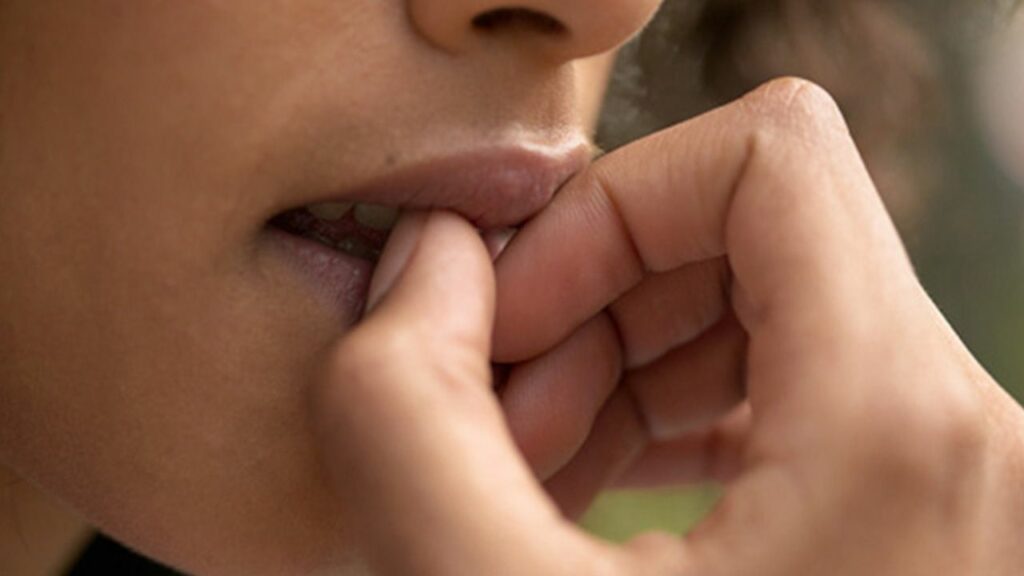Do you ever bite your nails? Or pull out your hair? If so, you’re not alone. Many people engage in body-focused repetitive behaviors (BFRBs), which are actions that individuals do to themselves on a repeated basis that results in physical or psychological harm. In this blog post, we will discuss the different types of BFRBs, as well as their causes and treatment options.
Contents
What Does Body-Focused Repetitive Behaviors Mean?
 Body-focused repetitive behaviors are a group of related disorders that involve persistent and repetitive behavior directed at one’s own body. It is often described as an urge to perform a behavior that results in the individual experiencing relief, pleasure, or satisfaction. Moreover, BFRBs is a catch-all term used to describe any chronic behavior that causes damage to the body.
Body-focused repetitive behaviors are a group of related disorders that involve persistent and repetitive behavior directed at one’s own body. It is often described as an urge to perform a behavior that results in the individual experiencing relief, pleasure, or satisfaction. Moreover, BFRBs is a catch-all term used to describe any chronic behavior that causes damage to the body.
It is believed that some specified types of BFRBs are included in DSM-V, however, the specific diagnostic criteria have not been finalized.
BFRBs can have a significant impact on an individual’s quality of life, causing problems with work, school, relationships, and social activities. People who suffer from BFRBs often feel ashamed, embarrassed, and alone. As a result, they may try to hide their behaviors from others.
Four Types Of Body-Focused Repetitive Behaviors
There are various types of body-focused repetitive behaviors, which can be broadly classified into four categories:
Hair-pulling (Trichotillomania)
This type of BFRB involves the persistent and repetitive pulling of one’s hair, which can lead to noticeable hair loss. Hair-pulling can occur on the scalp, eyebrows, eyelashes, or other areas of the body. People with trichotillomania may also chew on or eat their pulled hair.
This usually refers to the act of deliberately and repeatedly pulling out one’s hair from the roots. Hair pulling can lead to bald patches, and in severe cases, it can also result in permanent hair loss. Also, this includes common signs;
- preoccupation with hair pulling,
- tension or anxiety before and during hair pulling,
- pleasure or relief after hair pulling,
- and noticeable hair loss.
Skin-picking (Excoriation Disorder)
This type of BFRB involves persistent and repetitive picking at one’s skin, which can lead to open wounds and scarring. Skin-picking often occurs on the face, but can also affect any area of the body. People with excoriation disorder may also pick at scabs or other debris under their nails. In addition, skin picking can cause several problems, such as;
- redness, swelling, and bleeding from the skin picking site,
- skin infections,
- scarring, and
- emotional distress.
This even sounds painful, right? But for some people with this disorder, it can be hard to resist. They might feel pleasure, relief, or satisfaction after picking their skin.
Nail-biting (Onychophagia)
 Nail-biting is very often considered a normal part of childhood development. However, when it becomes a chronic and persistent behavior, it can be classified as an onychophagia. Nail-biting usually starts during childhood or adolescence and often continues into adulthood. Furthermore, this type of BFRB can lead to several problems, such as;
Nail-biting is very often considered a normal part of childhood development. However, when it becomes a chronic and persistent behavior, it can be classified as an onychophagia. Nail-biting usually starts during childhood or adolescence and often continues into adulthood. Furthermore, this type of BFRB can lead to several problems, such as;
- damage to the teeth and gums,
- infections,
- skin irritation around the nails, and
- emotional distress.
People need to understand that nail-biting is a disorder and should be treated as such. Just because it’s common, doesn’t mean it’s not a real problem. Nail-biting can have a significant impact on an individual’s quality of life.
Cheek Biting (Morsicatio Buccarum)
Cheek biting is a type of BFRB that involves the persistent and repetitive biting of one’s cheeks. It is the most common type of BFRB, with a prevalence rate of approximately 30%. Cheek biting can cause significant damage to the cheeks, including;
- inflammation,
- bruising,
- and even scarring.
However, the physical damage is not the only concern with cheek biting. This behavior can also lead to social and emotional difficulties, as it can be difficult to hide the damage from others. Cheek biting can also be a very difficult habit to break, as it is often done without conscious thought. It should be treated as a disorder and not simply a bad habit.
If you or someone you know is struggling with these types of BFRBs, there are resources available to help. Before they can be treated, however, it is important to first understand what these disorders are and how they can impact a person’s life.
What Causes Body-Focused Repetitive Behaviors?
The causes of body-focused repetitive behaviors are not fully understood. However, they may be related to:
- Abnormal levels of serotonin or other neurotransmitters in the brain
- Problems with the way information is processed in the brain
- A history of head injury or abuse
- Certain medical conditions, such as Huntington’s disease, Tourette’s syndrome, and obsessive-compulsive disorder (OCD.
One study suggests, that people with body-focused repetitive behaviors may have a hard time processing information in their environment. This can lead to feelings of anxiety and feeling overwhelmed. The need to perform these behaviors may be a way to cope with these feelings.
Other research suggests that these types of behaviors are a way to self-soothe and provide comfort. This may be because when someone performs these behaviors, they release serotonin in the brain, which has calming effects.
While the exact causes of body-focused repetitive behaviors are not yet known, this research gives us a better understanding of why some people may be more prone to developing these types of disorders. With this knowledge, we can begin to develop better treatments and interventions for those who are suffering from this.
Risk Factors For Developing BFRBs
 There are a few risk factors that have been identified for developing BFRBs. These include:
There are a few risk factors that have been identified for developing BFRBs. These include:
- Genetics: If you have a family member who suffers from BFRBs, you may be more likely to develop them as well.
- Stress: People who suffer from high levels of stress are more likely to develop BFRBs. This is because stress can lead to changes in the brain that make someone more prone to these types of behaviors.
- Anxiety: People who suffer from anxiety disorders are also at an increased risk for developing BFRBs. This is because anxiety can lead to changes in the brain that make someone more prone to these types of behaviors.
- Depression: People who suffer from depression are also at an increased risk for developing BFRBs. This is because depression can lead to changes in the brain that make someone more prone to these types of behaviors.
If you think you may be suffering from body-focused repetitive behaviors, it is important to talk to a doctor or mental health professional. They will be able to help you get the treatment you need. Otherwise, these behaviors can lead to serious problems in your life.
How Does BFRBs Related To OCD?
OCD and BFRBs share many common features, and it is not surprising that they are often comorbid, meaning people can have both disorders. As OCD refers to obsessions and compulsions, BFRBs refer to the repetitive behaviors people do to relieve anxiety or uncomfortable sensations. Both are usually done in secret and can cause significant distress and impairment in daily functioning.
There is evidence that BFRBs share a similar etiology to OCD, as they both seem to be associated with abnormalities in the brain circuitry responsible for regulating impulses and emotions.
Studies have found that people with BFRBs often have higher levels of anxiety and stress, which may contribute to their condition. Some research suggests that BFRBs may be a way of self-medicating in response to stress and anxiety.
Common Features Of Body-Focused Repetitive Behavior And OCD
- Recurrent, intrusive thoughts or images (obsessions).
- Repetitive behaviors or mental acts (compulsions).
- Attempt to control or suppress obsessions or compulsions.
- Significant distress or impairment in functioning.
- Onset typically occurs in childhood or adolescence.
- Both concerns with perfectionism at times
However, BFRBs and OCD can be distinguished by a few key features.
First, obsessions in OCD are typically not related to physical sensations. Whereas BFRBs are usually associated with some type of physical sensation (e.g., skin picking is often triggered by an itch).
Second, compulsions in OCD are generally done in response to an obsession (e.g., washing hands to reduce fear of contamination). Whereas repetitive behaviors in BFRBs are often done to relieve anxiety or discomfort (e.g., hair pulling to relieve tension).
How To Treat Body-Focused Repetitive Behaviors?
The treatment for BFRBs is very similar to OCD in that it is a combination of medication and Cognitive Behavioral Therapy. The first step is to see a psychiatrist or other mental health professional to get an accurate diagnosis. Once you have been diagnosed, the next step is to start treatment.
Cognitive Behavioral Therapy (CBT)
CBT is a type of therapy that helps change the way you think about things and how you react to situations. This can be done with a therapist in person or online. It usually takes 12-16 weeks to see results from CBT. This is related to the fact that it takes about that long for the brain to create new neural pathways.
Mantra Care provides an online CBT program that is specific to treating BFRBs. It was created by a certified psychiatrist who specializes in treating OCD and BFRBs. Even, on the website of Mantra care, you can find informational videos and blogs that can help you understand more about how to treat your BFRBs.
Habit Reversal Training (HRT)
 It is a type of behavioral therapy that focuses on helping people change their habits. HRT is effective in treating various types of BFRBs, such as skin picking and hair pulling. The first step in HRT is to identify your triggers. Once you know what triggers your BFRB, you can start to work on changing your response to those triggers.
It is a type of behavioral therapy that focuses on helping people change their habits. HRT is effective in treating various types of BFRBs, such as skin picking and hair pulling. The first step in HRT is to identify your triggers. Once you know what triggers your BFRB, you can start to work on changing your response to those triggers.
When this training is done with a therapist, it is shown the best effective results. Moreover, there are also some self-help books and online resources that can be helpful. Book your free consultation today at Mantra Care for a better tomorrow.
Medication
The most common type is SSRIs (selective serotonin reuptake inhibitors). These work by increasing the level of serotonin in the brain. Serotonin is a neurotransmitter that is responsible for mood and anxiety. Other types of medication include
- tricyclic antidepressants,
- antipsychotics,
- anti-anxiety medication.
Also, keep in mind that medications possess potential side effects too. So, before starting any medication, always consult your psychiatrist.
Self-care Tips
This is often important while treating any mental illness. Self-care can help reduce stress, which can trigger BFRBs. Moreover, caring for yourself is even the important and helps you in the long go. So, pay attention to self-care and self-priority as it enhances your self-confidence too. Here are some of the tips for self-care that include:
- eating a balanced diet
- getting enough sleep
- exercising regularly
- taking breaks when needed
- avoiding alcohol and drugs
If you or someone you know is struggling with BFRBs, please reach out for help. There are many resources available to get you the help you need. Recovery is possible! Moreover, these tips are also useful in the treatment of other mental illnesses.
Conclusion
To conclude, Body-Focused Repetitive Behaviors are a type of self-grooming behavior that can become problematic when they are excessive and/or interfere with daily life. Although the cause of BFRBs is unknown, there are treatments available to help manage them. If you or someone you know exhibits any of the above behaviors, please reach out to a mental health professional for help.
If this article has helped you in any way or you know someone who it may help, please share it with them to help them. Body-Focused Repetitive Behaviors are more common than people realize and by sharing information, we can help reduce the stigma associated with them. Thanks for reading!
OCD is a mental health disorder characterized by obsessions and compulsions. If you have any queries regarding Online OCD Counseling experienced therapists at MantraCare can help: Book a trial OCD therapy session


